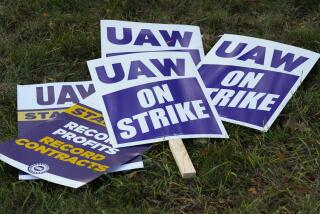LTV, Armco Close 6 Facilities in Midwest as Steel Slump Worsens
- Share via
The worsening crisis in the domestic steel industry claimed more victims Thursday when two major steel producers announced the closings of six facilities and the elimination of more than 2,500 steel-related jobs in towns scattered across the industrial Midwest.
In its first major production cutback since entering bankruptcy court proceedings last month, LTV Corp., the nation’s second-largest steelmaker, announced Thursday that it will indefinitely idle four steel mills and lay off 2,035 workers in Illinois, Indiana and Ohio.
But industry analysts warned that Thursday’s action by the floundering steelmaker will almost certainly be followed by more mill closings and worker layoffs if LTV is to reduce its excess steelmaking capacity and stem its losses.
Meanwhile, Armco Inc., a smaller steel producer, said its Reserve Mining subsidiary entered Chapter 11 bankruptcy proceedings on Thursday and shut down its iron ore mine and a separate processing plant in northern Minnesota.
Reserve Mining, which was previously a joint venture between Armco and LTV, supplied ore to the steel mills of both companies and employed 480 workers on Minnesota’s Iron Range. LTV pulled out of the partnership when it sought protection from creditors last month under Chapter 11 of the U.S. Bankruptcy Code.
Armco said Thursday that it couldn’t finance Reserve Mining on its own. The company also noted that the iron ore mining industry has been devastated by the slump in the U.S. steel industry, and so the resulting glut of iron ore mining capacity has been keeping ore prices depressed.
Armco wrote off its $235-million share of the assets in Reserve Mining in the second quarter, a one-time charge that accounted for most of Armco’s $384.7-million quarterly loss.
LTV, bloated with excess production capacity ever since it acquired Republic Steel in 1984, said it will idle its steel bar mills in Chicago, Hammond, Ind., and Youngstown, Ohio, along with a steel pipe mill in Campbell, Ohio.
The market for steel bars, which are used in heavy machinery and in automotive parts, has been especially hard hit by the flood into the United States of imported cars and other manufactured goods, which are made with foreign steel. Domestic shipments of hot-rolled steel bars plunged 40% between 1973 and 1985 as imports of cars, machine tools and heavy equipment surged, according to John Jacobson, steel analyst at Chase Econometrics, an economic forecasting firm.
At the same time, the steel tube and pipe business has been devastated by the collapse of the U.S. oil industry, which uses steel pipe in oil drilling. Campbell was LTV’s last seamless pipe mill, so the company is dropping completely out of the market for so-called oil-country goods, a company spokesman said.
LTV spokesman Mark Tomasch insisted that the plant shutdowns were not related to the firm’s bankruptcy proceedings but were simply the result of poor steel market conditions. He added that the closings were “not necessarily permanent” and said the plants could reopen if the steel business recovers.
But Jacobson and other analysts believe that the closings represent the first step in LTV’s struggle to streamline and reorganize its steel operations.
“This was the most obvious move LTV had to make,” Jacobson said. “Their bar and pipe operations were definitely in the most danger,” he added. “The decisions after this may be a little more difficult, and may not come as quickly, but they still need to close more mills.”
Robert Decker, steel analyst with Duff & Phelps in Chicago, also warned that despite the cost savings it will gain from the latest plant closings, LTV is still likely to seek more wage concessions from the United Steelworkers.
Although LTV has refused to say whether it will seek bankruptcy court approval to nullify its labor agreement, the union is girding for the worst. But it insists that union workers, who just granted steep concessions to LTV in the spring, will refuse to agree to any new wage cuts.
“Our members did all the accommodating they could do earlier this year,” said Jack Parton, director of United Steelworkers District 31, which represents Chicago-area mills, including LTV’s Hammond and Chicago facilities. “LTV should restructure its debt in a way that doesn’t come after its collective bargaining agreement.”
Separately, more than 22,000 steelworkers were entering their second week on strike against USX, the nation’s largest steelmaker, despite strong warnings from management that their jobs will be threatened if the strike is prolonged. No talks have been held since the strike began at midnight on July 31, and none are scheduled, a USX spokesman said.
More to Read
Inside the business of entertainment
The Wide Shot brings you news, analysis and insights on everything from streaming wars to production — and what it all means for the future.
You may occasionally receive promotional content from the Los Angeles Times.










